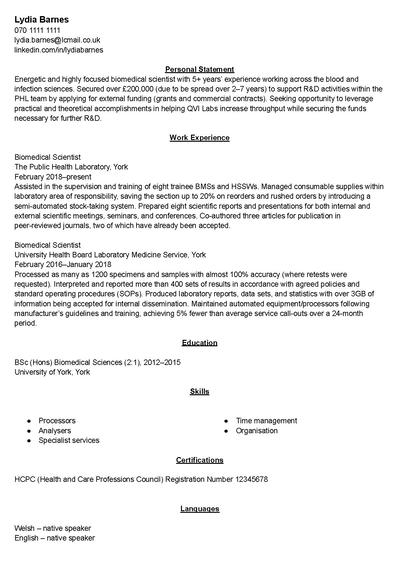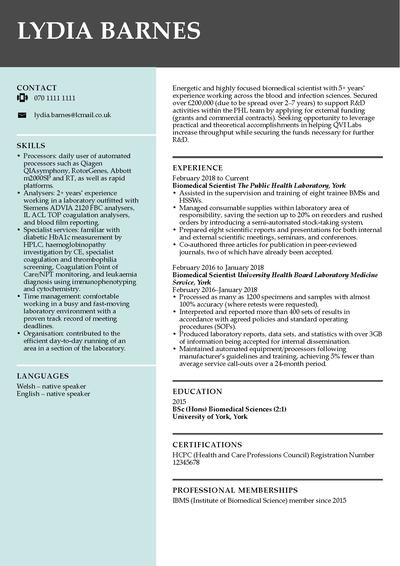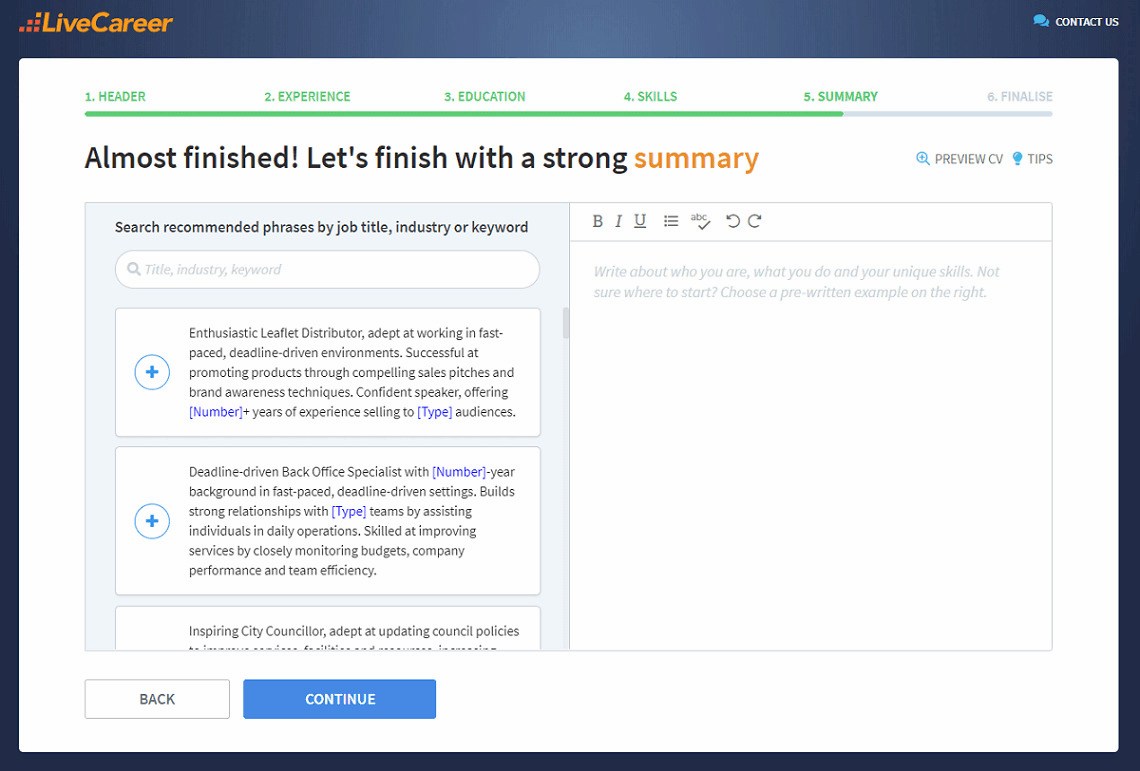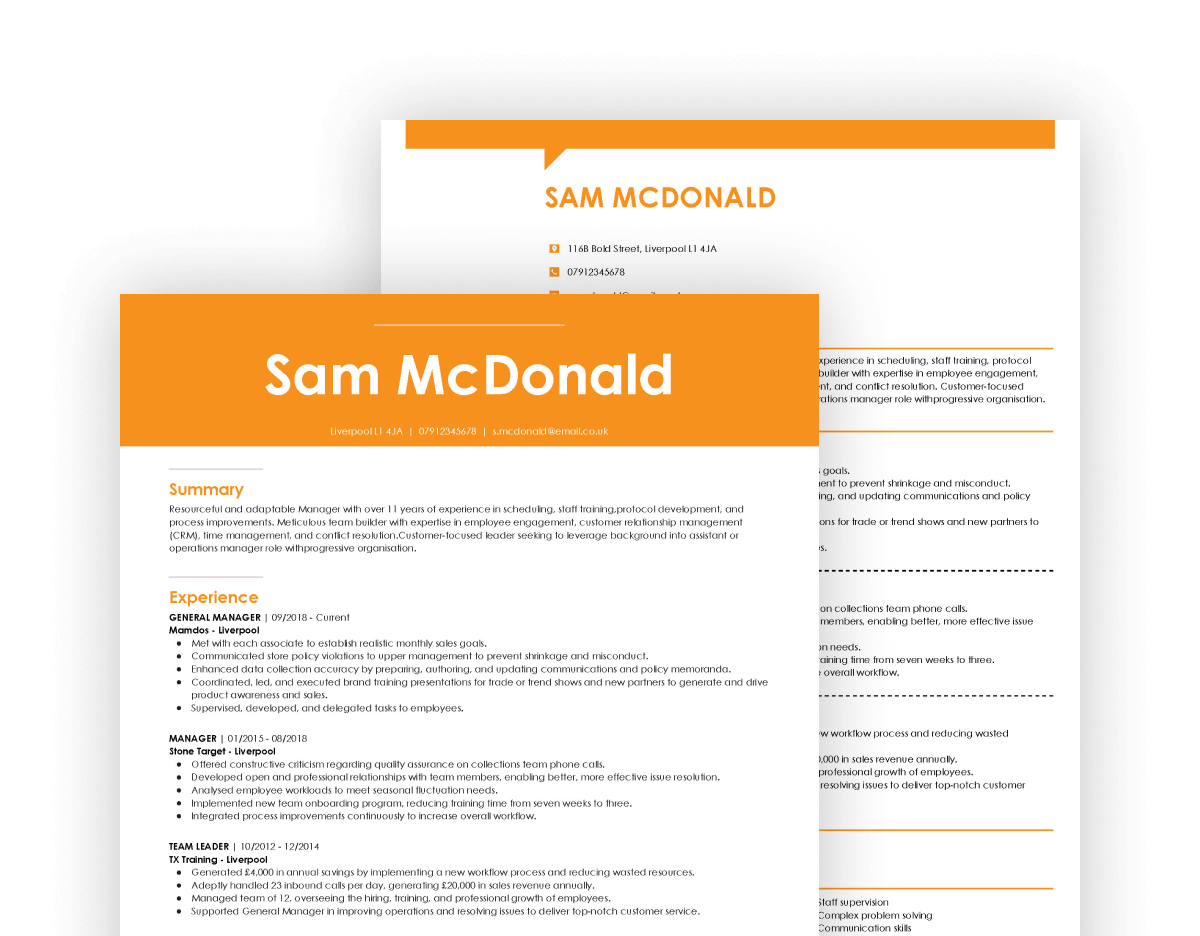Create a professional CV now!
 NO
NO YES
YESOur customers were hired by:
Biomedical science is an ever-evolving field and health care continues to be a dynamic industry with both private and public sectors constantly adapting to new circumstances. You’re on a career path that promises a variety of challenges and exciting opportunities as well as career-long learning.
Just like in any other vocation, there are amazing biomedical science jobs and there are dead-end ones that are best avoided. With some of the best biomedical science CV examples out there (see below) and plenty of expert, UK-specific, and up-to-date advice, you’re about to take a step in the right direction.
Create an effective CV in minutes. Choose a professional CV template and fill in every section of your CV in a flash using ready-made content and expert tips.
Create a professional CV now!
 NO
NO YES
YESWe created the sample on the right using our builder. See other good CV examples like this one.
Need a different CV? Check our other CV samples:
Haven't found your job? Check our full list of professional CV examples.
Based on over 6 million CVs created in our builder, we found out that*:
*The data comes from a period of the last 12 months (August 2023-August 2024).
Lydia Barnes
070 1111 1111
lydia.barnes@lcmail.co.uk
linkedin.com/in/lydiabarnes
Personal Statement
Energetic and highly focused biomedical scientist with 5+ years’ experience working across the blood and infection sciences. Secured over £200,000 (due to be spread over 2–7 years) to support R&D activities within the PHL team by applying for external funding (grants and commercial contracts). Seeking opportunity to leverage practical and theoretical accomplishments in helping QVI Labs increase throughput while securing the funds necessary for further R&D.
Work Experience
Biomedical Scientist
The Public Health Laboratory, York
February 2018–present
Biomedical Scientist
University Health Board Laboratory Medicine Service, York
February 2016–January 2018
Education
BSc (Hons) Biomedical Sciences (2:1), 2012–2015
University of York, York
Skills
Certifications
HCPC (Health and Care Professions Council) Registration Number 12345678
Professional memberships
IBMS (Institute of Biomedical Science) member since 2015
Languages
Welsh – native speaker
English – native speaker
Now you know what a CV looks like. Here’s how to write your own CV:
Your biomedical science CV personal profile (also often call a personal statement) is very likely to be the deciding factor in whether the rest of your biomedical science CV gets read favourably, or even at all. The typical reading order is this: your cover letter, then your personal statement, then the rest of your CV.
It’s true that some employers skip over cover letters entirely, so your personal profile should be able to serve as an adequate introduction in its own right. So introduce yourself by simply stating your job title, how many years’ experience you have, and in what specialisations or environments you’ve been working. The best way to give an indication of what it is that you have to offer is by describing what it is that you managed to do for your previous employer.
The final thing your biomedical science CV personal profile has to do is show that your work-related goals line up with your potential new employer’s business goals. This seems ill-defined, but you need only state in a single sentence what it is that you hope to achieve for your employer in this role.
There’s one more thing to keep an eye on, though. Your biomedical science CV might be parsed by an ATS (Applicant Tracking System) before a recruiter lays eyes on it. So be sure to mention the employer by name and the job title for which you’re applying in full. Mirror keywords from the advert where possible.
Your biomedical science CV personal profile comes first in your CV (preceded only your personal details), but it’s best that you write it last. You’ll be able to do a much better job with a lot less effort once you’ve gone through the process of preparing your skills section and job descriptions (and that’s why it’s also called a CV summary).
Keep your personal statement down to 3–4 sentences and 40–80 words.
Energetic and highly focused biomedical scientist with 5+ years’ experience working across the blood and infection sciences. Secured over £200,000 (due to be spread over 2–7 years) to support R&D activities within the PHL team by applying for external funding (grants and commercial contracts). Seeking opportunity to leverage practical and theoretical accomplishments in helping QVI Labs increase throughput while securing the funds necessary for further R&D.
A strong CV summary will convince the recruiter you’re the perfect candidate. Save time and choose a ready-made personal statement written by career experts and adjust it to your needs in the LiveCareer CV builder.

Biomedical science is without a doubt one of those jobs in which theoretical knowledge is of very limited use in the absence of experience and the know-how it teaches. Each lab is different with a different workplace atmosphere and general workflow. Plus, the work can be extremely dynamic at times.
Show that you’ve been there, done that, and now know what to expect. By far the best CV format for your biomedical science CV is going to be the chronological CV format. Contrary to its name, this format will have you ordering your job descriptions in reverse-chronological order. This is what employers expect to see.
Use this biomedical science CV template to generate a subheading for your current and each of your previous jobs:
[Job Title]
[Company Name, Location]
[Dates of Employment]
Populate each job description with up to six bullet points. Each bullet point will need to be an appropriately quantified achievement, just like the one you prepared for your biomedical science CV personal profile. You can use something like the CAR (Challenge Action Result) formula to structure your achievements.
Start each achievement off with a strong verb, like ‘organised’, ‘conducted’, or ‘analysed’. Quantify everything you can, but especially the benefits that you brought to your employer. It’s fine to estimate these things, but be sure to keep it realistic and be ready to justify your estimates if asked.
If you’re applying for a trainee biomedical scientist job or fresh out of university, then maybe you can prepare job descriptions focused on the volunteer work, internships, and placements you’ve done. If not, then consider writing a graduate CV or student CV instead and put this CV section after your education section.
Biomedical Scientist
The Public Health Laboratory, York
February 2018–present
Biomedical Scientist
University Health Board Laboratory Medicine Service, York
February 2016–January 2018
Many of the biomedical science CV examples you’ll come across will feature a biomedical sciences degree. Whether that fits your bill or you’ve gone through the NHS Practitioner Training Programme or started out as a trainee biomedical scientist, the education section of your biomedical science CV is critical.
Stick with a reverse-chronological format for this section as well. All three routes into becoming a biomedical scientist require A-levels with at least one science subject, but you can safely leave your high school education out of the picture if you’re a university graduate and have a year or more of experience.
Use the following biomedical science CV template to describe any post-secondary qualifications you have, including diplomas, NVQs, and so on. Definitely do include any qualification that you’re still working on—simply include your expected graduation date as the end date.
[Degree Type] [Degree Name](Degree Class), [Years Attended]
[Institution Name], [Institution Location]
The following two biomedical science CV templates will allow you to quickly and concisely detail your high-school education. Remember to only use them if you don’t have a university degree or you have a degree but less than a year’s worth of relevant experience.
A-levels: [Subject Name 1], [Subject Name 2], [Subject Name 3]
[School Name], [School Location], [Years Attended]
[number of GCSEs completed] GCSEs (including Mathematics and English)
[School Name], [School Location], [Years Attended]
That’s all the information you need to include. There’s no need to add anything not required by the above biomedical science CV templates, but you might want to add some bullet points highlighting your areas of excellence, extracurricular activities and academic achievements while studying if you lack work experience.
BSc (Hons) Biomedical Sciences (2:1), 2012–2015
University of York, York
Looking at work experience and education really boils down to making an indirect measurement of your biomedical science skills. The skills section is where this question of your biomedical science skills is tackled head-on. The trick is in standing out from a crowd of applicants with amazing skill sets but no proof.
You can do this by backing up each of your claimed skills with a sentence that describes—in concrete terms—how you’ve demonstrated each skill in the lab or workplace more generally. First, make a master list by opening a new document and making as long a list of biomedical science CV skills as you can.
Biomedical science is a fairly technical job, so it’s perfectly understandable that most of your skills will be hard skills and technical skills, just make sure your soft skills are represented too. Now go back through your list and add a sentence to each one showing how you’ve demonstrated it in action in the workplace.
Save your master list, you can add to it over time and copy a different set of skills from it for every new job application you prepare. For your current application, check the advert again and copy 5−10 biomedical science skills from your master list. Be sure to cover at least those that are explicitly required.
There’s a lot that goes into becoming and being a biomedical scientist that simply doesn’t fit into the standard categories of experience, education, and skills. Don’t skip over all the certifications, professional memberships, publications, and personal attributes that make you a good biomedical scientist.
Add extra sections to your biomedical science CV that will help paint a fuller picture of you and give you an edge over your competition. You could list any awards you’ve won, off-the-job achievements, even your interests and hobbies. The only rule is that everything has to be directly relevant to the job.
There’s at least one personal attribute that’s always relevant and worthy of mention in your biomedical science CV: the ability to speak languages other than English. It’s a good idea to include a section listing all your languages (and levels) even if you won’t have a chance to use them on the job.
Certifications
HCPC (Health and Care Professions Council) Registration Number 12345678
Professional memberships
IBMS (Institute of Biomedical Science) member since 2015
Languages
Welsh – native speaker
English – native speaker
Only a few biomedical science job adverts will explicitly require a cover letter as part of the application process. Most won’t mention a cover letter at all. In both cases, it should go without saying that you need to submit a cover letter with your biomedical science CV. Being asked not to is the only exception.
Pull up a good cover letter writing guide. It’ll show you how to start your cover letter for maximum impact right from the get go. You’ll also learn how to end your cover letter with a confident CTA (call to action) that shows recruiters how keen you are to move on to the next and subsequent stages.
A typical, well-structured biomedical science cover letter will end up being about 250–400 words long. This is a cover letter length that will allow you to nicely fill a single A4 page. A ‘nicely filled’ page is one that still has plenty of well-utilised white space on it. Never go over a single page in length.
Attention to detail and clear communication are incredibly important in the making of a good biomedical scientist. It’s a careful and methodical approach to your work that ensures the accuracy of your assays and analyses and communication skills that allow you to share the results of your work.
This is why submitting a biomedical science CV riddled with spelling and grammatical errors that’s haphazardly laid out and illogically structured is a great way to make the worst possible impression. Proofread your biomedical science CV and cover letter and run it past someone whose opinion you trust.
Take care of the overall readability of your job application by keeping the following basic CV design pointers in mind. Leave your contact details near the top of your CV where they’ll be easier to find. Use subheadings and lots of white space to break you perfect CV down into sections and subsections.
Choose an appropriate CV font for both your application documents and keep the size at an easily readable 11–12 points. Go with something understated like Noto, Garamond, Liberation, Arial or even Calibri. Limit the length of your CV to one A4 page per decade of experience, capped at two pages.
Always save or export your CV and cover letter in PDF to protect your formatting. Use less stable formats like *.docx only if you’ve been explicitly asked to do so—in these cases you should always do as requested or risk having your application rejected by an ATS at the very outset.
Simple CV templates work best for scientist CVs. If you’re going to use Canva CV templates, make sure they are ATS-friendly. You might want to try LaTeX CV templates if you’re familiar with the tool.
One last CV tip: your date of birth and full address don’t belong on a CV. So add your name and surname, telephone number, and email address (optionally your LinkedIn URL).
You don’t have to be a CV writing expert. In the LiveCareer CV builder you’ll find ready-made content for every industry and position, which you can then add with a single click.

I hope this article has shown you just how approachable and effective a biomedical science CV can be. Did you follow along with the guide? What were your results? Do you need any clarification on anything I’ve covered here? Leave your comments, questions, and experiences down below.
Our editorial team has reviewed this article for compliance with Livecareer’s editorial guidelines. It’s to ensure that our expert advice and recommendations are consistent across all our career guides and align with current CV and cover letter writing standards and trends. We’re trusted by over 10 million job seekers, supporting them on their way to finding their dream job. Each article is preceded by research and scrutiny to ensure our content responds to current market trends and demand.
About the author
Since 2013, the LiveCareer UK team has shared the best advice to help you advance your career. Experts from our UK editorial team have written more than one hundred guides on how to write the perfect CV or cover letter.
Rate this article:
Biomedical science cv
Average:

A data-driven CV worthy of a data analyst title. See a dedicated data analyst CV example for a graduate, a junior analyst, and a senior professional.
Keep Lidl in your sights by writing a cover letter for a Lidl job. Need a cover letter for a Lidl customer assistant job? See examples.
Craft a standout psychologist CV with our expert writing tips. See an inspiring psychologist CV example and follow the guide to personalise it.
Our customers were hired by: